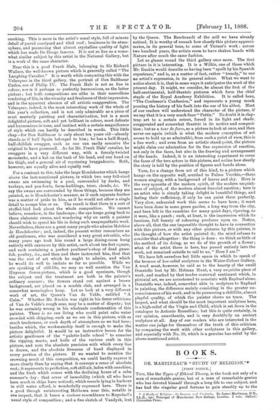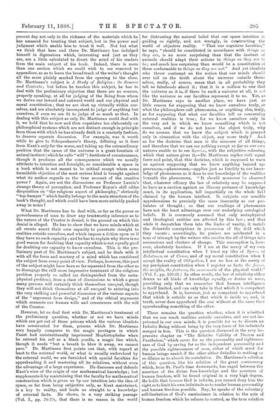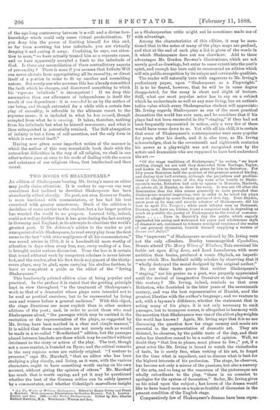BOOKS.
DR. MARTINEAU'S "STUDY OF RELIGION."*"
LPIRST NOTICE.i
Tim, like the Types of Ethical Theory, is the book not only of a man of remarkable genius, but of a man of remarkable genius who has devoted himself through a long life to one subject, and has had the singular good fortune to gain steadily up to the
• A Study of Religion : its Sources and Contents. By James Martineau. D D., LL.D.. late Principal of Manchester New College, London. 2 vols. Oxford Clarendon Press. present day not only in the richness of the materials which he has amassed for treating that subject, but in the power and judgment which enable him to treat it well. Not but what we think that here and there Dr. Martineau has indulged himself in digressions which, interesting and just as they are, are a little calculated to divert the mind of his readers from the main subject of his book. Indeed, there is more than one section which we could wish to see removed to appendices, so as to leave the broad track of the writer's thought all the more plainly marked from the opening to the close. Dr. Martineau's subject is A Study of Religion : its Sources and Contents; but before he touches this subject, he has to deal with the preliminary objection that there are no sources, properly speaking, at all for judging of the Being from whom we derive our inward and outward world and our physical and moral constitution ; that we are shut up virtually within our- selves, and are absolutely incompetent to judge of anything but ourselves, if even we are fit to judge of so much as that. In dealing with this subject as only Dr. Martineau could deal with it, we hold that he now and then expatiates too elaborately on philosophical systems which are not distinct enough in principle from those with which he has already dealt in a masterly fashion, to deserve separate discussion. For example, was it worth while to give to Schopenhauer's theory, differing as it does from Kant's only for the worse, and taking up the extraordinary position that the cause of the universe is a great fountain of animal instinct (which he calls "will") destitute of consciousness, though it produces all the consequences which we usually attribute to intention and foresight, so considerable a space in a book which is not meant to be critical except where some formidable objection of the most serious kind is brought against what its author regards as the true account of the creative power P Again, are not the discussions on Professor Laurie's strange theory of perception, and Professor Royce's still odder disquisition on "the religious aspect of philosophy," obviously " top-hamper " which hardly:belongs to the main structure of the book's thought, and which could have been more suitably packed away in notes P
What Dr. Martineau has to deal with, so far as the power or powerlessness of man to draw any trustworthy inference as to the nature of the Creator is denied, is the ground on which this denial is alleged. He has to show that we have minds which at all events assert their own capacity to penetrate straight to realities outside ourselves, and which impose a fiction upon us if they have no such capacity ; and he has to explain why there is no good reason for doubting that capacity which is not equally good for doubting our capacity to know ourselves. This is the pre- liminary part of Dr. Martineau's subject, and he deals with it with all the force and mastery of a mind which has considered the subject from every point of view. Perhaps, however, this part of the subject might have been so far separated from the other as to disengage the still more impressive treatment of the religious problem properly so called (as distinguished from the meta- physical problem), from a class of discussions to which a great many persons will certainly think themselves unequal, though they will not think themselves at all unequal to entering into the very striking and powerful discussion of the various aspects of the "argument from design," and of the ethical argument which connects our human wills and consciences with the will of the Creator.
However, let us deal first with Dr. Martineau's treatment of the preliminary question, whether or not we have minds which can get out of those prisons which the various idealists have constructed for them, prisons which Dr. Martineau very happily compares to the magic pentagon in which Faust had unintentionally imprisoned Mephistopheles when he entered his cell as a black poodle, a magic line which, though it needs "but a breath to blow it away, we cannot pass." Dr. Martineau first points out that, with regard at least to the external world, or what is usually understood by the external world, we are furnished with special faculties for apprehending it and mastering all its relations, without even the advantage of a large experience. He discusses and defends Kant's view of the origin of our mathematical knowledge ; but supplements it by maintaining that the faculty for mathematical construction which is given us by our intuition into the idea of space, so far from being subjective only, as Kant maintained, is a key to reality, and leads us straight to a knowledge of external facts. He shows, in a very striking passage (Vol. I., pp. 76-79), that there is no reason in the world
for distrusting the natural belief that our space intuition is guiding us rightly, and not wrongly, in constructing the world of objective reality. "That our cognitive faculties," he says, "should be constituted in accordance with things as they are, is no more surprising than that the instinct of animals should adapt their actions to things as they are to be; and much less surprising than would be a constitution of them conformable to things as they are not." And yet idealists who throw contempt on the notion that our minds should. ever tell us the truth about the universe outside them- selves, really, of course, mean that in all probability they tell us falsehoods about it ; that it is a million to one that the universe as it is, if there be such a universe at all, is not like the universe as our faculties represent it to us. Yet, as Dr. Martineau says in another place, we have just as little reason for supposing that we know ourselves truly, or what the philosophers call phenomena, or anything else, truly, as for supposing that what our faculties tell us concerning external realities is true ; for we know ourselves only in the very act in which we know something which is not ourselves, and if we do not know the object truly, why do we assume that we know the subject which is grasped only in connection with the object, any more truly P Anti as for the doctrine that man is the measure of all things, and therefore that we can see nothing except so far as our own natures enable us to see it,—i.e., with the subjective colouring which that nature gives it,—Dr. Martineau replies with equal force and point, that this doctrine, which is supposed to warn us against supposing that we know anything beyond ap- pearances,—phenomena,—applies just as forcibly to our know- ledge of phenomena as it does to our knowledge of the realities beneath the phenomena. "It should moreover be observed that, whatever efficacy the law of relativity may be supposed to have as a caution against an illusory pretence of knowledge must, in its application, tell impartially on the whole field claimed by the human intellect. It subjects our sensible apprehensions to precisely the same insecurity as our pos- tulates of thought ; so that our readings of phenomena have not the least advantage over our underlying ontological beliefs. It is commonly assumed that only metaphysical and theological entities are affected by this law ; and that while it despatches them into the limbo of vanity, it instals the Scientific conceptions in possession of the field which they vacate ; accordingly, its praises are celebrated in a tone of triumph by the writers who resolve the all of things into successions and clusters of change. This assumption is, how- ever, absolutely baseless. If I am at the mercy of my own intellectual constitution when I trust my idea of Space, of Substance, or of Cause, and of my moral constitution when I accept the reality of Obligation, I am no less at the mercy of my percipient constitution when I register as facts the forms, the weights, the features, the movements of the physical world." (Vol. I., pp. 120-21.) In other words, the law of relativity either denies us all kinds of knowledge equally, or denies us none, providing only that we remember that human intelligence is itself limited, and can only take in that which it is competent to apprehend. It is, however, just as competent to apprehend that which is outside us as that which is inside us, and, in truth, never does apprehend the one without at the same time apprehending something of the other.
There remains the question whether, when it is admitted that we can reach realities outside ourselves, and are not im- prisoned in our own minds, it is possible for us to discern an Infinite Being without being by the very force of his infinitude merged in him. This is the question discussed in the very im- pressive chapter on "The Relative Validity of Theism and Pantheism," which saves for us the personality and righteous- ness of God by saving for us the independent personality and the possible righteousness of man, either of which must for human beings vanish if the other either dwindles to nothing or so dilates as to absorb its correlative. Dr. Martineau's solution of this question, like his solution of the great controversy which, from St. Paul's time downwards, has raged between the asserters of the divine fore-knowledge and the asserters of human freedom, will be found original in a very high degree. He holds that because God is infinite, you cannot deny him the right so to limit his own infinitude as to render human personality and human freedom possible. Nay, he speaks of the voluntary self.limitation of God's omniscience in relation to the acts of human freedom which he refuses to control, as the true solution
of the age-long controversy between fr,e-will and a divine fore- knowledge which could only mean virtual predestination. If you deny him the power of limiting himself for this end, so far from asserting his true infinitude, you are virtually denying it and paring it away. Confining, he says, our atten- tion to man, " we have actually treated him as a separate cause, and so have apparently accepted a limit to the infinitude of God. Is there any reconciliation of these contradictory aspects of personality ? There is none if you assume that Infinite Will can never abstain from appropriating all its causality, or divest itself of a portion in order to fit up another and resembling nature. But surely one who assumes this has already committed the fault which he charges, and discovered something to which his 'rigorous infinitude' is incompetent ! If we drop this assumption then our allowance of independence is itself the result of our dependence : it is conceded to us by the author of our being, and though entrusted for a while with a certain free play of causality, is referable in the ultimate resort to the supreme cause : it is included in what he has caused, though excepted from what he is causing. It takes, therefore, nothing from his infinitude but what he himself renounces ; and what is thus relinquished is potentially retained. The Self-abnegation of infinity is but a form of self-assertion, and the only form in which it can reveal itself."
Having now given some imperfect notion of the manner in which the author of this very remarkable book deals with the antecedent difficulties in the way of all religion, we shall in our other notices pass at once to his mode of dealing with the source and substance of our religious ideas, first intellectual and then moral.




































 Previous page
Previous page